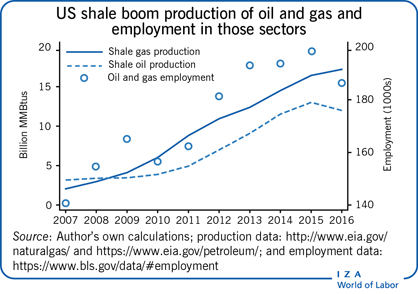Elevator pitch
One of the primary considerations in policy debates related to energy development is the projected effect of resource extraction on local workers. These debates have become more common in recent years because technological progress has enabled the extraction of unconventional energy sources, such as shale gas and oil, spurring rapid development in many areas. It is thus crucial to discuss the empirical evidence on the effect of “energy booms” on local workers, considering both the potential short- and long-term impacts, and the implications of this evidence for public policy.

Key findings
Pros
Employment increases during energy booms.
Local incomes and wage rates increase during energy booms.
Compensation-related benefits are widespread and occur across many industries, types of occupations, and segments of the wage rate distribution.
US experience suggests energy booms may lead to positive spillovers to other sectors.
Cons
Energy booms are associated with reduced educational attainment and student achievement in local areas.
In some cases, experiencing an energy boom may have negative effects on an individual's long-term income.
Volatility from energy booms may complicate spending and savings decisions, thereby affecting retirement choices and other life cycle outcomes.
Most research has focused on how energy booms affect individuals through monetary channels, but other dimensions are also important.
The literature disproportionately comprises studies from the US.